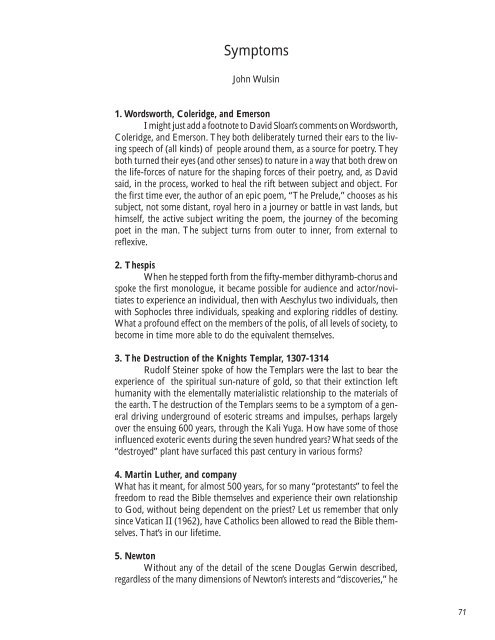Proceedings Colloquium on World History - Waldorf Research Institute
Proceedings Colloquium on World History - Waldorf Research Institute
Proceedings Colloquium on World History - Waldorf Research Institute
You also want an ePaper? Increase the reach of your titles
YUMPU automatically turns print PDFs into web optimized ePapers that Google loves.
Symptoms<br />
John Wulsin<br />
1. Wordsworth, Coleridge, and Emers<strong>on</strong><br />
I might just add a footnote to David Sloan’s comments <strong>on</strong> Wordsworth,<br />
Coleridge, and Emers<strong>on</strong>. They both deliberately turned their ears to the living<br />
speech of (all kinds) of people around them, as a source for poetry. They<br />
both turned their eyes (and other senses) to nature in a way that both drew <strong>on</strong><br />
the life-forces of nature for the shaping forces of their poetry, and, as David<br />
said, in the process, worked to heal the rift between subject and object. For<br />
the first time ever, the author of an epic poem, “The Prelude,” chooses as his<br />
subject, not some distant, royal hero in a journey or battle in vast lands, but<br />
himself, the active subject writing the poem, the journey of the becoming<br />
poet in the man. The subject turns from outer to inner, from external to<br />
reflexive.<br />
2. Thespis<br />
When he stepped forth from the fifty-member dithyramb-chorus and<br />
spoke the first m<strong>on</strong>ologue, it became possible for audience and actor/novitiates<br />
to experience an individual, then with Aeschylus two individuals, then<br />
with Sophocles three individuals, speaking and exploring riddles of destiny.<br />
What a profound effect <strong>on</strong> the members of the polis, of all levels of society, to<br />
become in time more able to do the equivalent themselves.<br />
3. The Destructi<strong>on</strong> of the Knights Templar, 1307-1314<br />
Rudolf Steiner spoke of how the Templars were the last to bear the<br />
experience of the spiritual sun-nature of gold, so that their extincti<strong>on</strong> left<br />
humanity with the elementally materialistic relati<strong>on</strong>ship to the materials of<br />
the earth. The destructi<strong>on</strong> of the Templars seems to be a symptom of a general<br />
driving underground of esoteric streams and impulses, perhaps largely<br />
over the ensuing 600 years, through the Kali Yuga. How have some of those<br />
influenced exoteric events during the seven hundred years? What seeds of the<br />
“destroyed” plant have surfaced this past century in various forms?<br />
4. Martin Luther, and company<br />
What has it meant, for almost 500 years, for so many “protestants” to feel the<br />
freedom to read the Bible themselves and experience their own relati<strong>on</strong>ship<br />
to God, without being dependent <strong>on</strong> the priest? Let us remember that <strong>on</strong>ly<br />
since Vatican II (1962), have Catholics been allowed to read the Bible themselves.<br />
That’s in our lifetime.<br />
5. Newt<strong>on</strong><br />
Without any of the detail of the scene Douglas Gerwin described,<br />
regardless of the many dimensi<strong>on</strong>s of Newt<strong>on</strong>’s interests and “discoveries,” he<br />
71
















